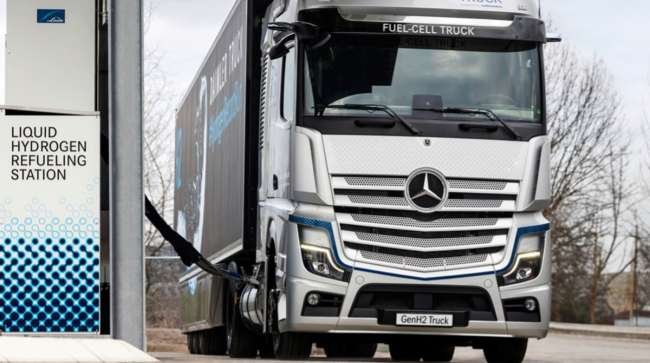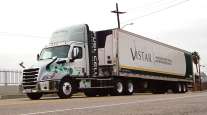Staff Reporter
Daimler Advances Longhaul Hydrogen Truck Prospects

[Stay on top of transportation news: Get TTNews in your inbox.]
Daimler Truck recently took another step toward commercializing its prototype longhaul liquid hydrogen-fueled trucks.
The parent company of Daimler Truck North America, which owns U.S. Class 8 truck brands Freightliner and Western Star, said the first fueling station was now open for its sLH2 subcooled liquid hydrogen.
Located in Wörth am Rhein, Germany, the refueling station is set to be the hub around which testing of sLH2 and Daimler Truck’s Mercedes-Benz GenH2 Truck will revolve in partnership with some of Europe’s largest fleet owners in the second half of the year.
Daimler Truck and partner Linde Engineering hope to establish sLH2 as a common refueling standard for hydrogen-powered trucks. The partners intend to make the technology available to anyone who is interested, they said Feb. 7.
The partners say sLH2 allows for higher storage density, greater range, faster refueling, lower costs and superior energy efficiency compared with gaseous and regular liquid hydrogen.
“With sLH2, hydrogen refueling becomes as convenient as today’s refueling with diesel. It takes about 10 to 15 minutes to fuel our Mercedes-Benz GenH2 Truck for a range of more than 1,000 kilometers [about 600 miles],” Andreas Gorbach, Daimler Truck board member responsible for truck technology, said in a statement.
“Subcooled liquid hydrogen considerably increases the efficiency of hydrogen refueling systems. This and further advantages make sLH2 a practical, CO2-neutral alternative to diesel in the heavy-duty vehicle sector,” Linde CEO Juergen Nowicki added.
Safe, Fast & Simple: #DaimlerTruck & #Linde Engineering present sLH2, a jointly developed refueling technology for subcooled #LiquidHydrogen
Together we aim to establish #sLH2 as a common #refueling standard for #hydrogen -powered #trucks
Learn more: https://t.co/c0n5FPs2nc pic.twitter.com/Iqe0TgEQc0 — Daimler Truck AG (@DaimlerTruck) February 7, 2024
Compared with regular liquid hydrogen refueling, sLH2 uses a revised pump to slightly increase the pressure of the liquid hydrogen, the partners said. Hydrogen in this state facilitates a robust fueling process that also keeps energy losses during refueling to a minimum, they added.
Refueling takes 10 to 15 minutes for a 40-ton or more than 88,000-pound heavy-duty truck, carrying 80 kg (about 176 pounds) of liquid hydrogen for a range of more than 1,000 kilometers. Also, sLH2 technology lowers the required investment for a hydrogen refueling station by a factor of two to three, and operational costs are five to six times lower, Daimler Truck and Linde said.
How does hydrogen fuel cell technology fit into freight transportation? Find out with Parker Meeks, the CEO of Hyzon, a company that designs and manufactures fuel cell technology for heavy-duty transport applications. Tune in above or by going to RoadSigns.ttnews.com.
With the technology and GenH2, Daimler Truck is arming itself against longhaul trucking disruptors such as Tesla, whose Semi truck achieved more than 384 miles (618 kilometers) on a single charge in September testing in the U.S.
Leinfelden-Echterdingen-based Daimler Truck is seeking allies in the fight too, not unlike its battery plant joint venture with Paccar and Cummins’ Accelera unit and Powering America’s Commercial Transportation zero-emissions infrastructure initiative with Navistar Inc. and Volvo Group North America.
Daimler Truck and Linde called upon other original equipment manufacturers, infrastructure companies and associations to apply the new liquid hydrogen standard and as a result establish a global mass market. Linde said it has the largest liquid hydrogen capacity and distribution system in the world.
Initial testing of sLH2 and GenH2 will be carried out by Amazon, Air Products, Ineos, Holcim and Wiedmann & Winz. Semis will be deployed in different longhaul applications on specific routes within Germany. The GenH2 truck is based on a conventional Mercedes-Benz Actros cabover longhaul truck.
Want more news? Listen to today's daily briefing above or go here for more info
The Actros also is the basis for Mercedez-Benz Truck’s eActros 600 heavy-duty truck, which was unveiled in October. The eActros 600, which can travel 311 miles on a single charge, also aims to compete with Tesla’s Semi.
All three trucks are being built at Daimler Truck’s Wörth am Rhein plant, which recently celebrated its 60th anniversary. The plant, which can build up to 470 trucks per day, is expected to produce diesel, battery-electric and hydrogen fuel cell electric tractors as part of Daimler Truck’s decarbonization plans.
Daimler Truck aims to offer a lineup of vehicles that is CO2-neutral when being driven in its core markets of Europe, the U.S. and Japan by 2039.
In September, Daimler Truck demonstrated the potential of the GenH2 by taking it on a 650-mile run in Germany. The overnight autobahn trip began at the Wörth am Rhein plant. The truck pulled a trailer hauling 55,000 pounds of gravel.
Fuel cell systems for the GenH2 trucks are provided by Cellcentric, Daimler Truck’s joint venture with Volvo Group.





